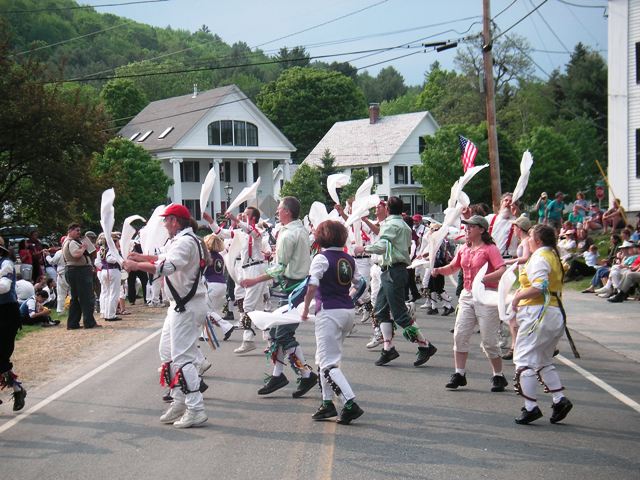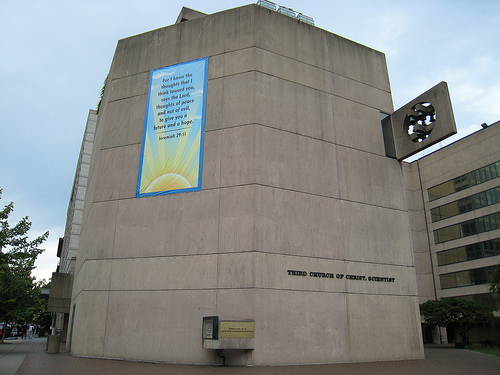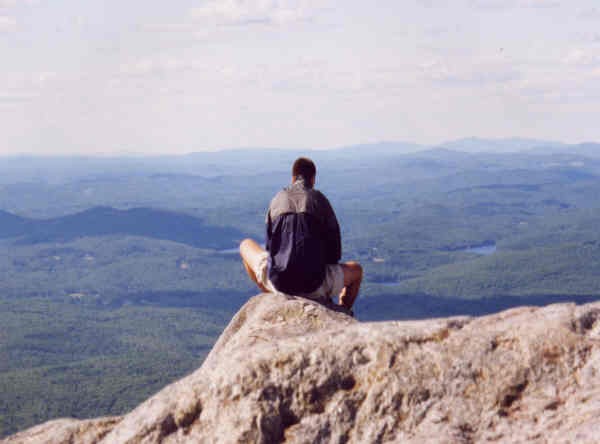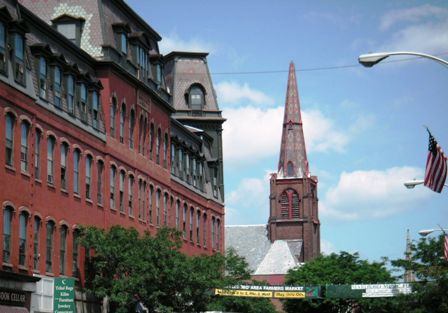|
political culture (ch 2)

Morris dancers, Newfane
You might find interesting a Pew study on "Trends in Political Values and Core Attitudes: 1987-2009;" one might expect that the results would be different after the 2010 election but whether these differences signal long-term changes or just a momentary blip is something only time will tell.
Points to ponder:
- The study of political culture is related to the study of political learning (aka the process of political socialization) which is concerned with how citizens learn about the political system and their role in it; political socialization takes into account both the cognitive (what people know) and affective (how people feel) dimensions of people as citizens
political socialization will be covered in Ch 6 on public opinion
- Coleman et al. identify six tenets that make up what they call the creed--equality, individualism, democracy and popular control of government (which means control of the government by the people, not that government is popular or widely regarded favorably), liberty, property rights, and religious freedom--suggesting that these six tenets are generally compatible ("with liberty and justice for all") but, while recognizing that there may be tensions (48) they don't give enough respect to the fact that there are many instances when a commitment to one tenet is in conflict with commitment to a second
take property rights (and liberty) and equality in the case of Lester Maddox: depriving African-Americans the right the eat at his restaurant is a violation of equal treatment, but forcing him to serve African-Americans infringes on his liberty to use his property as he wishes

or, can an agency of a popularly elected government block a religious organization from demolishing its church because the agency wants to preserve it as an example of "brutalist" architecture?
suppose a gay couple wishes to marry (a matter of liberty and equality) but some churches object to the practice as contrary to their beliefs--an issue that came up in New Hampshire in 2009
- While recognizing that there are conflicts over political values in the US, Coleman et al. don't give, to my way of thinking, enough credit to the fact that one can observe that there are persistent, fundamental divisions or cleavages in the US political system, cleavages that are manifested in many of our hottest political issues
the US is characterized as a system with multiple, cross-cutting cleavages (and the cross-cutting character of these multiple cleavages has the effect of moderating the intensity of political conflict); the three lines of cleavage in the US are
- ethnic (think of affirmative action, issues of law and order, welfare, school integration, English as a national language)
- religious-secular (think of abortion, school prayer, gay marriage)
- urban-rural (think of gun control, environmental protection, and land-use controls), though the urban-rural cleavage is relatively less potent
- Note the belief in the idea of natural rights (35), the idea that each individual has God- or nature-given fundamental rights which can not be rightly violated (remember "life, liberty, and the pursuit of happiness," which was a riff on John Locke's "life, liberty, and property"); a consequence of this is the belief that the government does not give us rights (look carefully at the phrasing of the first 8 amendments to the Constitution) but rather that we create goverment to protect those rights and that when government infringes on our rights rather than protects them (as the King and the British government did), the people have a right to rebel so assert those rights
- Mom, apple pie, and Chevrolet...well, ok, mom & apple pie: as will become clearer when we look at public opinion in Ch 6, US citizens, not unlike citizens in most representative democracies, are not deeply political nor deep political thinkers
- accordingly, while US citizens tend to agree with statements consistent with the creed as outlined by Coleman et al.--that is, they say they believe in equality and religious freedom, and property rights and all that--but that does not mean that they have a carefully worked-out political philosophy, nor that they have a very sophisticated understanding of what the particular tenets mean or how they ought to be applied
- the somewhat superficial attachment to the creed helps us understand why when push comes to show, when the rubber meets the road, citizens frequently do or say things that seem highly inconsistent with the creed; for example, see the uneven commitment to free speech (Coleman et al.: Table 2-1)
Questions to consider:
- To what extent are the six tenets of the creed--equality, individualism, democracy, liberty, property rights, and religious freedom --reflected in the Founders' design of the US constitutional system?
- Are there ways in which the institutions of government in the US have come to operate that challenge one or more of the tenets of the creed?
- Could the list of six tenets be reduced by combining individualism, liberty, property rights and religious freedom into a single category? How are these four principles related to each other?
- How does a "weak sense of sovereign power" (45) relate to separation of powers and federalism?
- To what extent do your results from the Political Compass and the thinking that lies behind the exercise correspond with what Coleman et al. have to say about the US political culture?
|



